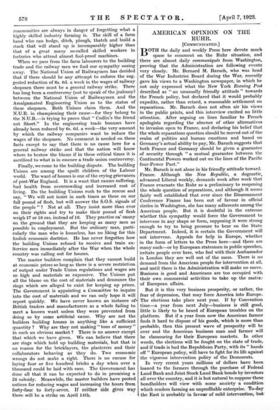AMERICAN OPINION ON THE RUHR.
[COMMUNICATED.]
BOTH the daily and weekly Press here devote much space to comment on the Ruhr situation, and there are almost daily communiques from Washington, proving that the Administration are following events very closely. Mr. Bernard M. Baruch, who was head of the War Industries Board during the War, recently gave his views to a Washington newspaper, in which he not only expressed what the New York Evening Post described as "an unusually friendly attitude" towards the French policy, but declared that it would probably expedite, rather than retard, a reasonable settlement on reparations. Mr. Baruch does not often air his views in the public prints, and this interview excited no little attention. After arguing on lines familiar to French apologists regarding the absence of other alternatives to invasion open to France, and -declaring his belief that the whole reparations question should be moved out of the realm of politics and human emotions and based on Germany's actual ability to pay, Mr. Baruch suggests that both France and Germany should be given a guarantee of security through "a mutual guarantee between the Continental Powers worked out on the lines of the Pacific four-Power Pact."
Mr. Baruch is not alone in his friendly attitude toward. France. Although the New Republic, a dogmatic, advanced Liberal weekly, demands week after week that France evacuate the Ruhr as a preliminary to reopening the whole question of reparations, and although it seems fairly well established that ever since the Disarmament Conference France has been out of favour in official circles in Washington, she has many adherents among the American people. But it is doubtful in the extreme whether this sympathy would force the Government to intervene in any shape or form, supposing it were strong enough to try to bring pressure to bear on the State Department. Indeed, it is certain the Government will not intervene. Appeals for help in Europe, whether in the form of letters to the Press here—and there are many such—or by European statesmen in public speeches, irritate people over here, who feel with their Ambassador in London they are well out of the mess. There is no demand from the American people for intervention at all, and until there is the Administration will make no move. Business is good and Americans are too occupied with their own commercial activities to take up the matter of European affairs.
But it is this very business prosperity, or rather, the fear of depression, that may force America into Europe. The elections take place next year. If by Convention time—a year from next July—business is still good, little is likely to be heard of European troubles on the platform. But if a year from now the American farmer finds it hard to dispose of his goods, which is more than probable, then this present wave of prosperity Will be over and the American business man and farmer will be clamouring for their European markets. In other words, the elections will be fought on the state of trade, and if trade is bad the Republican Party, with its "hands off "European policy, will have to fight for its life against the vigorous intervention policy of the Democrats.
In very recent years millions of dollars have been loaned to the farmers through the purchase of Federal Land Bank and Joint Stock Land Bank bonds by investors all over the country, and it is but natural to suppose these bondholders will view with some anxiety a condition which renders farming an unprofitable enterprise. To-day the East is probably in favour of mild intervention, -but- the Middle West and West are indifferent. However, the centre of population of the country is now around Indiana or Illinois, and the moment a demand for inter- vention becomes articulate in that section the Government will act very quickly. The demand will coincide with the first indications of depression. Farm produce represents thirty per cent, of this country's total exports, so it is easy to see that the Middle West farmer is a _particularly good political barometer on this matter.











































 Previous page
Previous page